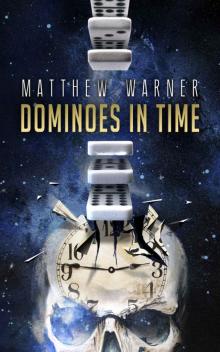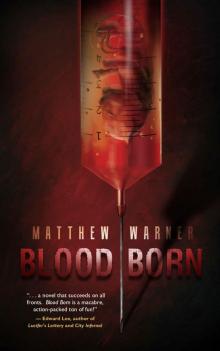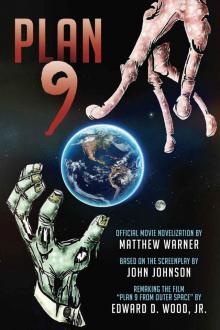- Home
- Matthew Warner
Blood Born Page 23
Blood Born Read online
Page 23
There was the sound of clacking computer keys. “If you’re nice to me, maybe.”
She made her voice sultry, playing along. “Honey, I’m always nice to men in uniform, especially mailman uniforms.”
“Hmph.” More computer sounds. “There’s an F.O. dating back a year on that address. Forwards to a post office box.”
“Oh? Where?”
Scott laughed. “Right here in this very building.”
“That’s . . . well, that’s great! And it makes sense. He doesn’t work far from there. Are there any other addresses linked to the box? Like another billing address?”
“No. I’m sorry.”
Randall considered staking out the mailbox to see if Schaefer showed up. No, that would be impractical, especially now. “Okay, how about giving me access? Tonight.”
“Access? Well, that depends on how fast you can get a search warrant.”
Randall buried her face in her hand.
✽ ✽ ✽
The conversation went on for a while, but Scott was adamant that he absolutely would not, under any circumstances, give her access to a post office box without something official, like a search warrant or a subpoena duces tecum. That was the law, and she should know better.
Randall explained the extenuating circumstances: the general police order that hamstrung her ability to conduct proper investigations, and her need to find this Nick Schaefer guy as soon as possible since he might know something about the cause of the bigfoot attacks. But Scott said he didn’t care about any of those things. He wasn’t going to lose his job and go to prison for her.
Randall knew he was right. There was only one other tactic she could try.
“You wouldn’t do it . . . not even for a date with me?”
The line fell silent. This lasted long enough for her to wonder if she’d gone too far. I’ve totally done it to myself this time. It’ll be a wonder if I still have a badge after this.
Finally, Scott laughed. “Now you’re playing dirty with me.”
Randall chuckled back, but she didn’t know what else to say. It was completely in his hands now. She was afraid of what he might say or do.
“I’m sorry, Randall. I’d really like to help you, but—”
“I understand. I’m sorry. Just forget I said it.”
“Look, all I got to say is . . . I’m leaving here in fifteen minutes. This place is empty, and it’s scary. If you want to mail something, you better get over here pronto. Okay?”
“All right, Scott. Take care of yourself. I’m sorry I asked you to do that—it won’t happen again.”
“No problem. Place closes in fifteen.”
After they hung up, Randall closed her eyes and shuddered. God, I’m such a fuckup.
She replayed the conversation in her head, trying to assess how far she’d stepped over the line and what it could mean to her career.
Then she slapped her forehead. I’m a bigger idiot than I thought.
If you want to mail something, he said, you better get over here pronto.
Scott may not have been willing to color too far outside the lines tonight, but he wouldn’t stand in her way if she chose to do so.
Randall grabbed her car keys and hurried out the door.
✽ ✽ ✽
Randall raced to the Merrifield post office. She was still driving her Hyundai because all the police vehicles were in use. The roads were devoid of traffic except for a National Guard personnel carrier parked in the center median on Route 7. She placed her rotating emergency light onto her dashboard and switched it on to discourage them from stopping her.
The public entrance to the warehouse-sized post office was dark and devoid of people—and no doubt locked. Randall parked in the empty parking lot and tried the door anyway.
“Dammit,” she said when the door only jiggled under her hand. “It’s been less than fifteen minutes.”
She felt exposed standing there although there were no bigfoots in sight, so she got back into her car. She used Heager’s cell phone to call Scott’s work number. This time, he failed to pick up.
Shit, what do I do now?
She began to drive clockwise around the complex. The place was as big as a shopping mall, and circling it reminded her of her days as a patrol officer, when she would scan mall parking lots for suspicious activity. By definition, people sitting in cars with no apparent intention of going into a store or leaving were considered suspicious. Such people were usually doing drugs or drinking with their boyfriends or girlfriends. She would have welcomed finding such a display now. But this whole town was dead and filled with strange vermin.
Eventually, she reached the postal complex’s many loading docks. Here, huge white trucks, abandoned in the process of loading and disgorging mail, stood side-by-side, backed up to the many garage door openings. Each dock was closed up tight.
All except for one.
Randall stopped and switched on her flashlight. She had to use her handheld Maglite because her civvie vehicle didn’t have an outboard spotlight on her window post.
I sure hope Scott left that door there open for me, she thought—which was possible because she wasn’t too far from his part of the building.
She got out, and because it made her feel better, drew her gun. Constantly scanning her surroundings with the flashlight, she climbed the stairs built into the loading dock and squeezed past the rear of the truck parked there to get inside.
Another door led into a giant warehouse room. Here, sorting machines and work tables spread across a football-field-sized work area. Piles of mail that might never reach their destinations waited in boxes and canvas bags. It seemed wrong for the place to be so quiet. Her flashlight cast long-tailed shadows that began to make her pulse pound.
I’m losing my edge.
“Scott?”
She wasn’t sure what to expect—perhaps his bloody body sprawled across a hallway, interrupted in the course of unlocking the door for her. She headed for his office in the back.
And when she arrived, she found . . . nothing. It was like Scott had never been there tonight: lights off, computer off, the desk calendar turned to last week. She reholstered her gun and sighed—but still listened for any sounds of breathing or approaching footsteps.
Well, now that I’m here, I might as well look inside that P.O. box. No one’s here to stop me. Except . . . what number was it?
Chastising herself for not asking him, Randall searched Scott’s tiny office for a clue. She shined her flashlight beam across piles of candy wrappers and coffee-stained printouts. It would have been easier to switch on the room’s overhead lights to do this, but she didn’t see the need to advertise her presence more than necessary. The debris covered every surface evenly, like dust accumulated in a tomb.
Only one area beside his computer was clear of detritus, so her attention went there. Lying in the middle of this oasis of cleanliness was a post-it note stuck to the desk. It contained a handwritten message: “Randall— Don’t throw away my heart.”
Throw away, she thought. Throw away. What does he mean, don’t throw away—?
She looked into his trash can.
Inside, lying atop more effluvium, was another post-it note in the same handwriting.
“Box 1246,” it said. “You’re welcome.”
✽ ✽ ✽
At first, Randall wondered how she would open Schaefer’s P.O. box—why didn’t Scott leave her a key?—until she realized she could access it from the internal side, from where postal employees loaded mail into it. It took some hunting around—the facility was surprisingly maze-like—until she found a room containing the honeycomb rows of P.O. box openings, labeled by number. Schaefer’s, 1246, was the size of a shoebox and at knee level. Randall stooped and shined her flashlight inside, feeling self-conscious.
I am gonna get in so much shit for this.
Her beam illuminated a thick pile of mail. She pulled the envelopes out and flipped through them. Her fingers were trembling, and a couple pieces
dropped to the floor.
The first was a blue envelope of coupons addressed to N.C. Schaefer at this P.O. box. Then a credit card solicitation, again addressed to N.C. Schaefer at this P.O. box. But oh, here was one: a sweepstakes offer for “Our Neighbor at 11620 Monument Drive,” with a forwarding order label sending the envelope to . . . N.C. Schaefer at this P.O. box.
Well, shit. What did you expect, Chrissy? A note from him saying, “Here’s where to find me”?
The rest of it was more mail that was forwarded from the Monument Drive address: a half dozen envelopes from various real estate firms and investment corporations, including one from the legal department at the Wegmans grocery chain. She opened this last one with her finger and found what she expected: an offer to purchase the vacant land. For five million bucks.
Jesus, what’s so valuable to him that he’d pass up an offer like this?
She stuffed the opened envelope into her pocket and then stooped to pick up the ones she’d dropped. Another credit card solicitation addressed to him at this P.O. box. And . . .
A Wachovia bank statement.
She ripped it open.
The statement, for a “free” checking account—no savings account—didn’t have a bona fide street address for him, either. What it did have was an extensive list of ATM and check-card transactions. The ATM entries revealed frequent, large withdrawals—a few hundred dollars a couple times a week—which he easily afforded since it looked like he received a large payroll direct deposit every two weeks from CalPark Holdings & Company in San Francisco. The check card debits appeared as lines like, “Safeway #49665” and “Radioshack 8703A3850” and were for small amounts.
A picture started to form of this guy. The Monument Drive address in Fairfax with its forwarding order to this P.O. box could only have one purpose: to provide him with a place to receive any mail that required an actual street address, such as car tax bills, while at the same time concealing his true street address. He probably used an alias wherever he lived, perhaps paying his utility bills with cash—most utilities allowed it so long as you paid them in person—which might explain all the cash withdrawals. He apparently used his debit card for his everyday needs, such as gas and groceries.
Except . . . why? Why go through this trouble to launder your mail to conceal your home address when your business address is so plainly known?
The answer came to her in a moment. Schaefer expected somebody—like a police officer—to one day come knocking on his door after work hours, catching him off guard. His business location, while being known, at least had the advantage that he might not be there every day.
This was all conjecture, of course—more bullshit, more “maybes” and suspicions and not a lot of hard facts. It certainly wasn’t enough to justify trampling over someone’s Fourth Amendment rights, state of emergency or not. And all on the basis of a hunch. She was overstepping her bounds because this had become personal, and she knew it. For that reason alone, she deserved to be thrown off the force.
With an aching head and heart, Randall slipped the bank statement into her pocket with the Wegmans letter. She returned the rest of the mail to the P.O. box, then got the hell out of there.
✽ ✽ ✽
A half hour later, Randall pulled into the parking lot of a service station near the corner of West Street and Route 7. She began scanning the parked vehicles.
She was now driving an unmarked cruiser from headquarters that had been returned while she was at the post office. She’d hesitated before taking its key ring from the peg board where keys hung when not in use. This wasn’t a typical night, when she could just check out any available vehicle to drive—every spare scrap of equipment was being used in the overall bigfoot-control effort—but she had appropriated the keys anyway. I won’t have it out long, she told herself.
On the passenger seat lay printouts from the bevy of proprietary police databases she had consulted while at the station. The printouts deciphered the entries on Schaefer’s bank statement, translating such items as “ATM 6002 Wachovia - Falls Church” into street addresses. She had learned that most of Schaefer’s transactions occurred within the same half-mile radius, so she was now here in the hopes of finding his Camaro.
As she drove through the parking lots of the various carpet stores, pharmacies, and restaurants along this stretch of Leesburg Pike, finding nothing, she kept an ear on the police band for UPA activity. All was relatively quiet in this neighborhood—for now, anyway—and there was virtually no traffic. That was good, because she still felt dirty about what she was doing. She didn’t want anyone to see. Even so, other police cars and Humvees twice slowed to check her status. All units were now patrolling in pairs, and it was unusual to find a cop out by herself. More National Guardsmen, helicopters, and armored vehicles were pouring into the county, and this area would soon be even more locked down. In fact, a curfew was going into effect within the hour. Randall ducked into a neighborhood side street.
She felt foolish and self-conscious. What she should have been doing at this point was reporting to the station and requesting a duty assignment. Even the sergeants were out, wearing vests and riding shotgun in tactical vans, coordinating with the new command-and-control structure to hunt down and neutralize bigfoot nests.
The internal pressure to conform, to give up this vendetta and stop neglecting her duty, was becoming overwhelming. Despite how she felt about the federal fuckheads who had taken over, she needed to report her findings to someone in authority—someone she could trust—and to let him or her decide whether this was worth pursuing. Then, any breaches of law or standard operating procedure would be somebody else’s fault.
By the time she came to this conclusion, Randall was driving slowly down a wooded residential street south of Route 7, less than a mile from her starting point. On each side, she passed huge brick and wood single-family homes, victims of a real estate market in which the owners judged it more affordable to renovate and expand than to move. Randall had long ago considered the resultant mishmashes of old and new architecture to be “Frankenhouses.” Today, they looked uglier and more foreboding than ever. Except for the rare street lamp that pushed back the darkness, the houses appeared dead and abandoned. In some cases, they sported newly shattered windows and broken doors. She decided to circle around on this looping street back toward the Pike and from there to return to the police station, where she would cease being a loose cannon. She would hide Schaefer’s stolen mail at her apartment and worry about him another day.
That’s when she glanced down a side street and spotted the silver Camaro parked by a curb.
✽ ✽ ✽
She slammed her brakes so hard that the anti-lock mechanism chattered on. “Holy . . .” she said as she jerked the gear shift into reverse and backed up. She swung her car’s nose around until she pinned the Z28 in her headlights.
It was the right car. The plates matched the DMV record—except now, when viewed from the back . . .
She leaned over her steering wheel as she drew closer, taking in the car’s wide brake lights and rear spoiler. The low-hanging muffler.
She remembered it from two nights ago. She’d been on I-66 in the HOV lane, listening to Sergeant Lively on the radio giving his press conference. This car—this same, silver car with its low muffler—passed her like she was standing still, and she stupidly decided to let it go because she was on her way to the station and because she was feeling sick and not like playing traffic cop. Oh, but how she regretted that choice now.
She stopped her cruiser and got out, diverting half of her attention to her surroundings in case some dick-happy UPA tried to ambush her. She looked inside and found the car to be as spic and span as the scientist’s laboratory no doubt was. Out of habit, she glanced at the car’s county and state stickers and found everything to be current.
Okay, so now what?
She looked about her at the nearest houses, which sat dark and ominous behind barriers of holly bushes. Well
, she had a choice: sit out here in the hopes that Schaefer would eventually come to his car (which might be never), start knocking on doors and risk tipping him off, or go away and come back later with help—but risk losing him again.
After a moment and a deep breath, she started up the front walk of the nearest house. But then she did a one-eighty and returned to her car. She keyed in her location and status (“misc. investigation by foot”) in case something went wrong. No need to be any stupider about this than necessary.
Within fifteen minutes, Randall had knocked on the door of every house on the street. She hadn’t found Nicolae C. Schaefer. In most instances, nobody answered the door—not surprising considering that half the county had evacuated by now. But there was also the possibility Schaefer was at home in one of these monstrosities and saw her and was simply not coming to the door. At the few houses that did open to her, the frightened people who answered said they didn’t know any Nick Schaefer, nor did they know the owner of the silver Camaro parked on their street. Randall even showed them a color printout of Schaefer’s driver’s license photo—a fortyish, dark-skinned man with a long, humorless face—but again they said they didn’t know him.
Discouraged, she returned to her cruiser and sat inside of it with the lights off, glowering at the silver sports car. She supposed Schaefer could have parked here and walked to wherever he was living on another street. That would make sense if he used an assumed name. After all, why go to the trouble of concealing your whereabouts if you were only going to park your registered car in front of your secret hideout? . . . And this meant that she could be here for hours, canvassing streets and further exposing herself to unnecessary UPA risk.
“Oh, screw it—I’m outta here,” she said and put her car into gear.
A small part of her hoped and expected Schaefer would emerge from the bushes at that very moment. But he didn’t emerge.
Reluctantly, she pulled away, watching the Camaro in her rearview mirror until she turned off the street and it fell out of sight.
✽ ✽ ✽
As she drove, she still wondered if Schaefer had been inside one of those houses she knocked on but had simply not answered the door. It was a distinct possibility. So, she asked herself, imagining Sergeant Tucker’s gruff voice, what if that clown really had been in one of those houses? What would his first instinct be now that you’ve left the neighborhood?

 Dominoes in Time
Dominoes in Time Blood Born
Blood Born Cursed by Christ
Cursed by Christ Plan 9- Official Movie Novelization
Plan 9- Official Movie Novelization